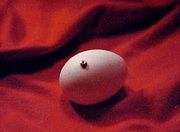Egg
From Plastic Tub
(Difference between revisions)
| Revision as of 03:04, 10 May 2005 Payne (Talk | contribs) usage; center photo ← Go to previous diff |
Revision as of 10:04, 10 May 2005 Adkins (Talk | contribs) Usage - --sp Go to next diff → |
||
| Line 6: | Line 6: | ||
| ---- | ---- | ||
| - | "You have to crack a few eggs to make an omlet." | + | "You have to crack a few eggs to make an omelette." |
| : -- an unrepentant Stalin | : -- an unrepentant Stalin | ||
Revision as of 10:04, 10 May 2005
egg n. 1. A single testicle. 2. Historically, one half of the ingredients necessary for the creation of a new human; a piece of generative equipment. 3. A storage facility for potential of any kind, in this sense a very small and discolored watermelon. 4. Sixth sign on the O'Donnely Zodiac Placemats. 5. The eventual solidification of vapor, occurring over thousands of years and as such, highly valuable. 6. An ingredient for the manufacture of pancakes.
Usage"You have to crack a few eggs to make an omelette."
ExtrapolationContrary to much modern science, eggs were not invented by man but rather harnessed. As vessels of fecundity or veiled potentiality, the egg and the nut are closely related. The nut's protective casing -- masculine and hard -- distinguishes it from the fragile femininity of the delicate egg. See Also |
 Eggs have only one natural enemy -- mouths. Desiderata
Stimes Addisson called eggs "volcanoes in a jar." Eggs have been known to attack humans they see as weak or dissolute. An egg starred in several films by Johannas Desselsen.
|
